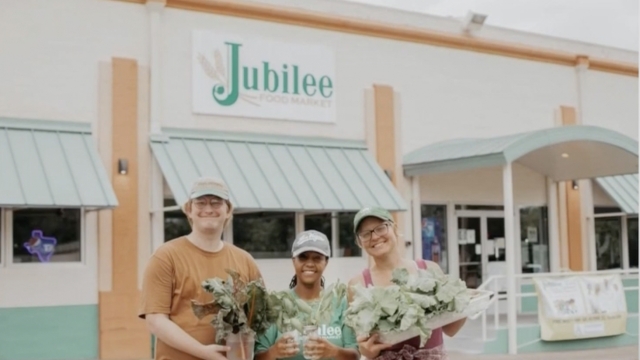The newest numbers on inflation came out this week and showed inflation stabilizing over the last few months.
But the impact of the last few years remains, especially when it comes to groceries. Shopping for food simply costs far more than it did a few years ago, and there's not much folks on the ground can do to change that.
What they can change involves access.
Perry Eakles knows it well. When he stocks the shelves at his south Dallas market, it's a triumph. It's a triumph that the market even exists in a neighborhood used to neglect.
"I've had people just walk in and just literally just bust out crying," Eakles said. "This store was a godsend for so many people."
But it only exists because of an approach that doesn't always work, but is becoming more common.
Roughly 44 million Americans live in households that are food insecure. It's a number rising almost as fast as the price of groceries, which are up 20% in the last five years. Both are influenced by forces beyond the control of the communities hit most.
Eakles' market, the Southpoint Community Market, shows a community taking back control. It's among a growing number of nonprofit grocery stores. These are not big chains but modest markets run through the community, for the community, to bring access and fair prices.
SEE MORE: Surprise: Some grocery stores moving away from self-checkout
Southpoint is run by a church: Cornerstone Baptist Church, one block away.
"Right now, we currently have one grocery store that services 16,000 residents," said Pastor Chris Simmons.
On this morning, after the shelves were stocked, Simmons and the staff went through financials with an accountant. Last year they sold $300,000 worth of groceries, most bought from bigger stores farther away.
"Food prices have just continually, steadily gone up," said Pastor Simmons. "On the other hand, there has been the continual reduction in food benefits. And I think there are churches and other nonprofits that need to rise up and say, 'What can we do to address the needs in our communities?'"
The same mission drives The Grocery Spot in Atlanta, North Market in Minneapolis, and the Jubilee Market in Waco, Texas. All are nonprofit markets that have sustained. Many others haven't, mainly because sustaining requires grants, funds, and help beyond the market.
"When we first opened up, there was a professor that said that we probably wouldn't last six months if we didn't sell alcohol, tobacco, and lottery tickets," Eakles said. "Well, come June 19, 2024, we'll be open for three years."
Eakles often buys food from the shelves he stocks.
"When you're living paycheck to paycheck, I mean, a store like this is greatly needed," Eakles said. "It gives you hope. It gives you opportunity to say, 'Well, you know what? I can still pay that bill, and I can still be able to come up and pick up a few things,' which in the past you just had either/or."
The triumph may be tenuous. But stores like Southpoint reflect efforts by communities to not simply live with neglect. Stocking shelves gives Eakles a paycheck. Lifting south Dallas feeds him with purpose.
"It's a great, great pleasure. It's a beautiful thing, and I'm just loving every minute of it," Eakles said.
Trending stories at Scrippsnews.com





